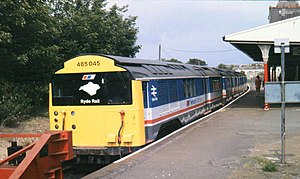| British Rail Class 485 British Rail Class 486 | |
|---|---|
 485045 at Shanklin. | |
| In service | 1923 - 1964 on London Underground 1967 - 1992 on Island Line |
| Manufacturer | Metro Cammell, Union Construction Company, Cammell Laird |
| Family name | Tube |
| Successor | Class 483 |
| Formation |
|
| Diagram |
|
| Capacity |
|
| Operators | Network SouthEast |
| Specifications | |
| Maximum speed | 45 mph (72 km/h)[4] |
| Weight | |
| Electric system(s) | 660 V DC 3rd rail[5] |
| Track gauge | 1,435 mm (4 ft 8+1⁄2 in) standard gauge |
The British Rail Class 485 (or 4Vec, later 5Vec) and British Rail Class 486 (or 3Tis, later 2Tis) electrical multiple units were originally built for the London Electric Railway from 1923-31 as its 'Standard' tube stock. They were purchased by British Rail in 1967 and transported to the Isle of Wight to work 'mainline' services on the newly electrified Ryde to Shanklin line,[1][6] where they worked for an additional quarter of a century. At the time of their purchase the units had already worked for over 40 years on the London Underground, but their introduction allowed the last steam locomotives on the line to be withdrawn.[6]
- ^ a b c "Class 485, 486 - 4VEC, 3-TIS". The Railway Centre. Archived from the original on 17 July 2012.
{{cite web}}: CS1 maint: unfit URL (link) - ^ "Southern E-Group - Class 485 and 486". Archived from the original on 8 April 2008. Retrieved 2 April 2008.
- ^ Vehicle Diagram Book No. 210 for Electric Multiple Units (Including A.P.T.) (PDF). Derby: British Railways Board. 1981. EB261, EB262, EE260, EH261. Archived from the original (PDF) on 3 March 2016. Retrieved 18 February 2016 – via Barrowmore MRG.
- ^ a b Fox 1987, p. 92
- ^ "Route Specifications 2016 Wessex" (PDF). Archived (PDF) from the original on 6 May 2021. Retrieved 4 April 2021.
- ^ a b "Welcome to the Southern E-mail Group Web Site". sremg.org.uk. Retrieved 23 March 2022.
